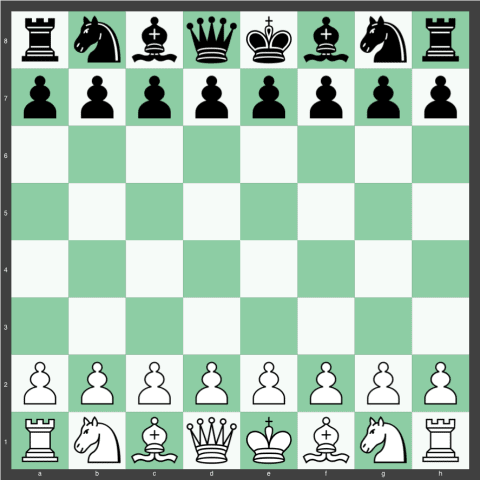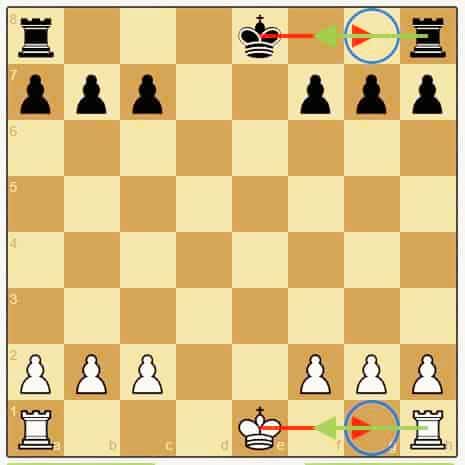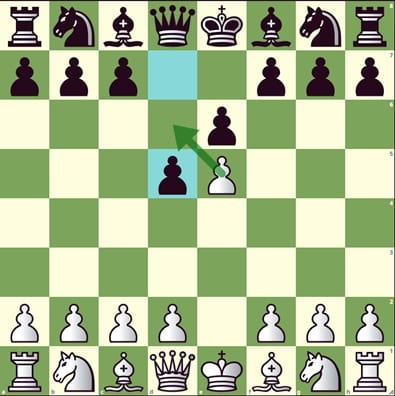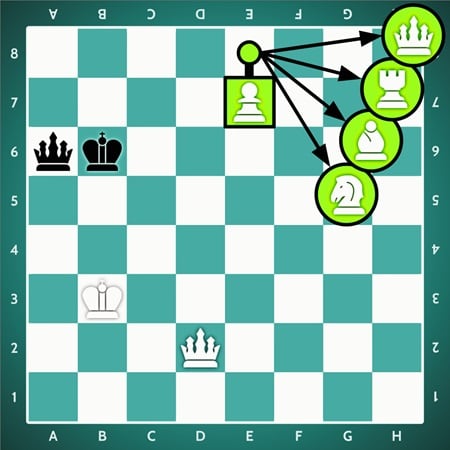
OBJECTIVE OF CHESS: The goal is to capture or “check” your opponent’s king, backing him into a corner with no escape option. Checkmate!
NUMBER OF PLAYERS: 2 players
MATERIALS: A chessboard, 32 chess pieces
TYPE OF GAME: Board Game
AUDIENCE: All Ages
OVERVIEW OF CHESS RULES
The exact origins of chess are unknown, but many believe that chess evolved from a similar game in India some two thousand years ago! The game of chess that we know today has been around since the 15th century, first popularized in Europe.
Below, we will review the standard chess rules and some variations, strategies, and more.
SETUP
The setup is as dictated in the picture below. The pawns act as the first line of defense, and the row behind you setup as follows: The two rooks occupy the corners, and you place the knights next to them, followed by the bishops. The Queen is placed on one of the remaining squares with the corresponding colors, meaning the white Queen is on the white “lighter” square, and the black Queen is on the black “darker” square. You then place the king on the remaining open square.

WHAT’S IN THE BOX
The game consists of a board with 64 squares of alternating colors. Each player has 16 pieces, including eight pawns, two knights, two bishops, two rooks, one Queen, and one king.
UNDERSTANDING CHESS PIECES
There are a lot of Chess pieces! That can feel very overwhelming when learning, but do not worry, we have the all laid out for you below.
Pawn
On its first move, a pawn can move two spaces; after that, it can only move one square at a time. Pawns can only move forward unless they are in a position to capture. You can capture pieces that are one square diagonally in front of pawns but not directly Infront. They cannot move or capture backward. If there is a piece directly in front of them, they cannot move. If a pawn reaches the other side of the board, you can exchange it for any other type of piece. This is called a promotion. The pawn is the only piece you can promote, and it is usually exchanged for a queen since the Queen is very powerful.
Rook
The Rook can move any number of squares horizontally or vertically across the board but cannot move diagonally. They cannot jump other pieces, but they can capture any of their opponent’s pieces that they run into. Rooks can be powerful players when working together and can do much to protect one another.
Knight
The Knight moves in the shape of an “L,” moving two squares in one direction and then one more square at a 90° angle. Knights cannot move on the diagonal. Knights can jump over any piece that stands in its way and capture any piece it lands on.
Bishop
The bishop can move any number of squares on the diagonal. Each bishop must stay on the same color square as its original starting position.
Queen
Considered the most powerful of all the pieces, the Queen has the abilities of both the Rook and the bishop. They can move any number of squares horizontally, vertically, or on the diagonal. The Queen captures any opponent piece she lands on but cannot move through pieces.
King
This is the most important piece of the game. It can move one square at a time in any direction but cannot move itself directly into check.
HOW TO PLAY CHESS
Chess is a 2-player strategy game. Learning the basics of chess may be easy, but mastering the game takes time and patience. We will review all the Chess rules you need to play the basic game below.
WHO GOES FIRST IN CHESS
The age old question of every game, who gets to go first? White always goes first. Therefore, opponents should determine a fair way to decide who will be white before the start of the game. The most common way to pick who plays white first is for one player to grab a white pawn and a black pawn and jumble them up; their opponent then picks a hand randomly. If players plan to play more than one game, they must alternate colors at the start of each new game. This allows both players to have equal opportunity to take the first move, which some say can make or break the who game!
MOVING YOUR PIECES
Each piece moves differently, which sounds overwhelming, but gives you a world of possibilities! Most pieces cannot move through each other but you can move them to take the place of an opponent’s piece, thereby capturing it. The exception to this rule is the Knight, which can ostensibly move “through” other pieces. Usually, you move pieces strategically to capture an opponent’s piece, defend a piece of your own, or maintain control of important squares on the board. However, you may or may not move particular pieces for numerous other reasons, so do not beat yourselves up about it if you do not. For example, you may be attempting to queen a pawn or get control of the center (of the board). Strategically, controlling the center is advantageous because many tactical battles occur there.
SPECIAL CHESS RULES
There are a few special rules you should know about before jumping into Chess. These are higher level moves that can really improve your chances of winning, but require a lot of forethought.
CASTLING

This very important rule allows you to achieve two things: your king’s safety and the introduction of your Rook into the game. On their turn, a player can move the king two spaces over toward the corner and the Rook to the right of the king. You can only do this move under the following conditions:
- This must be the very first move of the king.
- It must be the very first move of the Rook.
- There can be nothing in between the king and Rook.
- The king cannot be in check or pass through a check.
EN PASSANT

This is a special move for the pawn. When a pawn first moves, it can move two spaces instead of one. If the pawn moves two spaces forward and lands directly to the side of an opponent’s pawn, the opponent can make a special move with their pawn and capture the pawn that has just moved alongside it. To capture the piece, the pawn moves to the square directly behind their opponent’s pawn. The opponent must make this move immediately; otherwise, this move becomes illegal, and they lose the chance to capture in this way.
PROMOTING A PAWN

You promote a pawn by moving it across the board to the furthest line on your opponent’s side. Once a pawn reaches the back row, you can exchange it for a Queen, Rook, Bishop, or Knight. These pieces are always available for promotion, even if you have yet to lose your pieces. Most of the time, a player will promote their pawn to a queen, referred to as Queening. Turing your pawn to any other piece is considered underpromoting.
HOW TO CHECK
Before checkmate, you must put your opponent in check. Check means you will have a checkmate unless the opponent moves their pieces to protect their king. The king can get out of check-in three ways:
- Move the king out of the way. Remember, the king can only move one space in any direction.
- Block the king with another one of your pieces. This tactic works well to block an opponent’s Queen, Rook, or bishop, but not the KnightKnight, as knights can jump over other pieces on the board.
- Capture the piece threatening the king.
HOW TO CHECKMATE
The goal of the game is to checkmate your opponent’s king. Checkmate occurs when the king is in check, and he cannot get out of it.
DRAW
A game can end in a draw. There are several reasons why this can occur; below are the top three examples.
- It’s a stalemate, meaning the king of the player whose turn it is to move is NOT in check, yet the player has no other legal moves he can make.
- There aren’t enough pieces left on the board to accomplish a checkmate. For example, a king and a knight cannot achieve checkmate; however, a king and a rook can.
- If players mutually agree to stop playing. You may offer a draw during a move by declaring, “I offer a draw.” Your opponent may take as much time as they please to consider the offer. If they accept the offer, they will verbally agree and shake hands. However, if they make a move, the offer is considered declined. It is impolite to offer a draw during your opponent’s move. Distracting your opponent mid-play is frowned upon.
CHESS STRATEGY
- MATERIALS: Many pros always keep a material count. This means counting up the points of the pieces left for each player on the board. For this, Pawns are worth 1 point. Knights and bishops are worth 3 points. Rooks are worth 5 points, and queens are worth 9 points. Being able to compare counts allows a player to know their standing and how risky they can afford to play.
- ACTIVITY: You want to keep a close eye on the activity on the board. More so, you want to assess how many active pieces your opponent has. An active piece can move freely and is in a position to make important moves.
- PAWN STRUCTURE: Pawns are a king’s first line of defense and offense. If you can see the structure of the pawns without considering any other pieces, you can see if your board is strong or weak. Having pawns blocking and leaving space in the right places is crucial.
- SPACE: Space, like pawn structure, is to see your board’s ability. You need more space to move pieces, which may affect your ability to attack or defend. On the other hand, having lots of space increases your advantage over the board, giving you more options for moving pieces.
- KING SAFETY: King safety is the most crucial aspect of the game. If you have an unsafe king, your chances of winning shrink. You should always have protection around your king so that it does not become an easy target.
CHESS VARIATIONS
Above, we have covered the standard Chess rules. In this section, we plan to explain a couple of variations to the game you will love.
CHESS BOXING
Chess Boxing brings two very unlikely sports together. This game mixes rounds of high-level chess playing with brutal rounds of boxing. Imagine trying to concentrate on your next chess move while dodging blows. It is impressive! When playing, you can win by either knockout or checkmate! However, you can also lose for excessive time or boxing fouls.
SOVEREIGN CHESS
Sovereign chess is often described as one of the most complex forms of the game. The game is still for two players but played on a 16X16 board. Players will still be assigned white or black, but several other colors of pawns are lining the edges of the board. Players can control these pieces by having a piece on the same colored square on the board. Despite its differences, the end goal is to checkmate your opponent’s king.
BEST CHESS PLAYERS OF ALL TIME
Chess is more than a game; it’s competitive and, for some, a whole lifestyle. These people below are regarded as the top players of all time.
Magnus Carlsen
Magnus Carlsen is often thought ofas the best player of all time. He is from Norway and, before turning 30, had already reached the status of one of the top players. He has also reached the title of Grand Master at only 13!
Garry Kasparov
Garry Kasparov was born in Russia and became the world champion in 1985. He was also the youngest to become the champion at the time, at only 22 years old! In 1996, he defeated Deep Blue, a chess computer!
Vishy Anand
Vishy Anand was born and raised in India, where he first learned to play chess from his mother at just six years old. In 1988, he became an international Grand Master and won his first major championship in 1991!
Bobby Fischer
Bobby Fischer was an American-born chess player. He dropped out of school at 16 to fully dedicate himself to chess. He won the first of 8 American championships in 1958. In 1975, he ruses to meet his challenger for a championship, and his title is taken and given to his opponent. He then would not publicly play chess for the next 20 years!
Anatoly Karpov
Anatoly Karpov was born in Russia and became the 12th world champion, a title he held for ten years! He won over 160 first-place titles then and reached Grand Master status in 1970. He is gradually retiring from chess competitions, only playing at rapid events.
If you love chess, try out other similar games like checkers.
FAQ
When Was Chess Invented?
The most common theory is that chess was invented during the 6th century in India.
How Do You Get Better at Chess?
There are lots of ways for you to get better at chess. You can read strategy books, learn famous openings and games, play for more practice, or find a mentor.
What Is a Blunder in Chess?
A blunder occurs when a player plays a move that significantly affects their chances of winning.
What Is a Stalemate in Chess?
A stalemate occurs when you cannot legally move but have not been placed in check. This ends the game in a draw.
- 12 BEST HARRY POTTER BOARD GAMES - November 16, 2023
- 50 BEST HALLOWEEN GAMES - October 4, 2023
- 50 BEST CHRISTMAS GAMES - September 13, 2023
Thank you for having the time and effort on sharing this amazing blog with us! I’ll probably read more of your articles.
Hi Betfair, thank you!
its cool